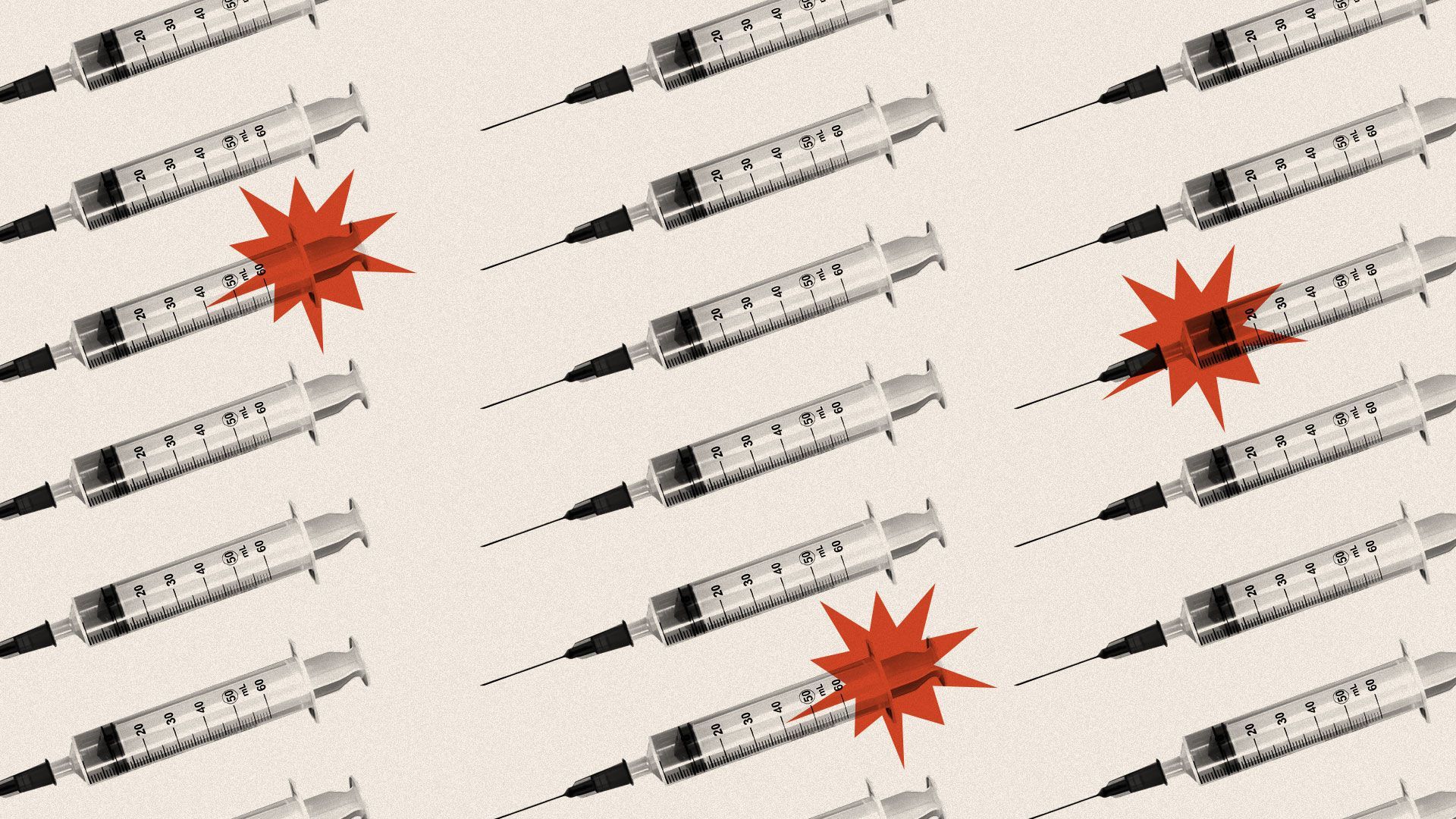The coming clash over the first coronavirus vaccines
Add Axios as your preferred source to
see more of our stories on Google.

Illustration: Eniola Odetunde/Axios
Global demand will be high for a successful COVID-19 vaccine, even if it's years down the road before any become available.
State of play: There will not be enough vaccines to meet initial demand, experts say. That’s left nations racing to secure future supplies and international organizations scrambling to make sure there is equitable access to any vaccines for the novel coronavirus.
What's happening: The COVID-19 vaccine race is underway, with at least 92 in development and more expected. They're based on different approaches that have different manufacturing processes.
- There are a limited number of facilities that are large enough for massive scale-ups and/or are flexible enough to switch to a different type of vaccine than they were originally intended to produce.
- Over the next several months, there's expected to be a "winnowing" of these potential vaccines as data from initial trials are collected, but it will take time before it's known which vaccine(s) are best, according to a group of experts at a press briefing hosted by the nonprofit ONE on Thursday.
- Having a global dialogue now on how vaccines should be scaled up and distributed is key, experts say.
Beyond the logistical problems is the likelihood that nationalism could stymie the process. The swine flu outbreak of 2009 offers a good example.
- Most of the initial H1N1 vaccine production was pre-contracted out to various (mostly wealthy) governments, highlighting the problem of inequality.
- On top of that, nationalism delayed the fulfillment of those contracts for some countries. When an Australian company brought the first single-dose vaccine to market, its government said it must offer them to the domestic market before exporting — leading to a shortage of vaccines, a confusing list of first recipients, and congressional hearings in the United States.
It's not clear if drug companies have contracted out to governments at this point, but ONE CEO Gayle Smith, who was an adviser to President Obama during the 2014 Ebola pandemic, called for transparency on this from drug companies to prevent a similar scramble as "basically the bulk of that [H1N1] vaccine was already owned before it even came on the market."
- Already there are signs of protective measures, which experts also acknowledge are natural tendencies.
- Bloomberg reported Wednesday that President Trump was launching "Operation Warp Speed" to get 100 million doses to Americans by year-end (considered extremely optimistic).
- U.K. groups announced a similar goal Thursday.
Meanwhile, international organizations like the World Health Organization, Gavi and CEPI are working with the private sector to ensure equitable access worldwide.
- The top priority for the first round of vaccinations should be people like health care workers essential in the pandemic fight and the regions where epidemiologists say it would be best to halt the spread of the virus, Smith says.
- Eventually, the world should be vaccinated, as this coronavirus could easily find a foothold and spread again.
- "As much as everyone's concerned about their own personal situation and each country is concerned about that country's situation, because of the nature of the virus ... unless we're able to interrupt transmission, ultimately no one wins," Hannah Kettler, director of vaccine financing and partnerships at PATH’s Center for Vaccine Innovation and Access, tells Axios.
- "Equitable access is so critical," Seth Berkley, CEO of Gavi, the vaccine alliance committed to increasing supplies to developing nations, tells Axios.
How it works: Tech transfer will be vital to enabling multiple countries to produce any successful vaccine — and to make it readily available first to the people facing the greatest need at that time, Berkley says.
- Public-private partnership will be key for this, Johns Hopkins' Eric Toner. points out. "If there is one vaccine that turns out to be far away better than others, it clearly is in the interest of the world for that vaccine to be manufactured" everywhere, he tells Axios.
- Some Big Pharma companies, nonprofits and governments have announced they are investing upfront, or "at risk," in a move to scale-up faster. For example, Johnson & Johnson has committed to producing more than 1 billion doses globally, if its vaccine is successful.
The bottom line: Global dialogue is needed now to avoid a chaotic mess that could further inequality once a successful vaccine is available.
Go deeper: Axios' Special Report on pandemic science, part 1
